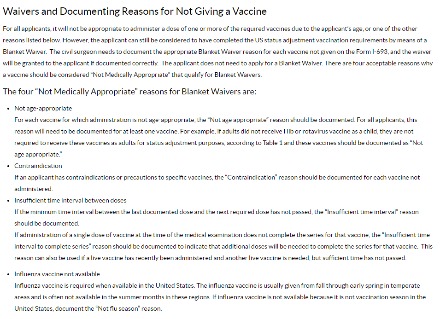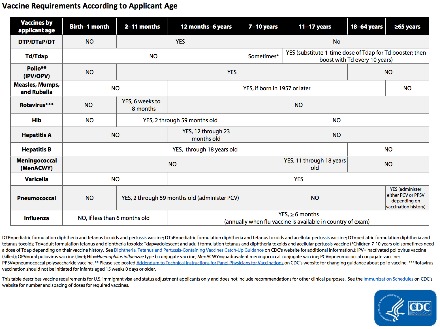Waivers of Vaccination-Related Inadmissibility

- Introduction
- Statutory Background
- Waiver for Alien Who Subsequently Presents Documentation of Missing Vaccinations
- “Not Medically Appropriate” Waiver
- Religious Belief or Moral Conviction Waiver
- Waiver Remains Valid for Subsequent Entries
- Conclusion
Introduction
Under section 212(a)(1)(A)(ii) of the Immigration and Nationality Act (INA), an alien must have received certain vaccinations in order to be admissible as an immigrant. This applies both when the alien is seeking an immigrant visa through consular processing and when the alien is seeking lawful permanent resident (LPR) status through adjustment of immigration status. We examined the vaccine requirement in general in a separate article [see article]. In this article, we will examine the U.S. Department of State (DOS) Foreign Affairs Manual (FAM) and the United States Citizenship and Immigration Services (USCIS) Policy Manual (USCIS-PM) to understand the limited waivers to the vaccine requirements that are available for immigrant visa and adjustment applicants.
Statutory Background
The statute setting forth the vaccine related inadmissibility provision is found in section 212(a)(1)(A)(ii). We discuss the statutory background in detail in our main article on the subject [see section].
In this article, we will focus on the available limited waivers of the vaccination requirement. These waivers are found in section 212(g) of the INA. The statute lists three distinct waivers.
INA 212(g)(2)(A) — “[A]ny alien … who receives vaccination against the vaccine-preventable disease or diseases for which the alien has failed to present documentation of previous vaccination.”
This is the most straight-forward of the three waivers. If the alien had previously failed to present documentation that he or she had received all of the required vaccinations, the alien may have section 212(a)(1)(A)(ii) waived if he or she subsequently presents the requisite documentation.
INA 212(g)(2)(B) — “[A]ny alien … for whom a civil surgeon, medical officer, or panel physician (as those terms are defined by [42 C.F.R. 34.2] certifies, according to such regulations as the Secretary of Health and Human Services may prescribe, that such vaccination would not be medically appropriate.”
A waiver may be eligible if the civil surgeon, medical officer, or panel physician performing the qualifying medical examination determines that a vaccination or certain vaccinations would not be medically appropriate for the applicant. We will examine some of the rules and guidelines regarding when vaccines are “medically appropriate” in this article.
INA 212(g)(2)(C) — “[A]ny alien … under such circumstances as the Attorney General provides by regulation, with respect to whom the requirement of such a vaccination would be contrary to the alien's religious beliefs or moral convictions.”
The final waiver applies if the alien states that receiving vaccinations would be contrary to his or her religious beliefs or moral convictions. There are specific rules regarding the implementation of this waiver provision. We will explore these rules in this article.
In addition, vaccine-related inadmissibility may be waived for an adjustment applicant in the U.S. if the vaccine is unavailable due to a nationwide shortage or it may be available abroad for a visa applicant if the vaccine is determined by panel physicians to be not routinely available. Generally speaking, this situation would fall under section 212(g)(2)(B).
In the subsequent sections, we will examine the four different types of waivers in more detail.
In order to do so, we will rely on the FAM for visa applicants abroad, the USCIS-PM for adjustment of status applicants, and Center for Disease Control (CDC) guidelines for the administering of vaccines.
Waiver for Alien Who Subsequently Presents Documentation of Missing Vaccinations
Under section 212(g)(2)(A), an alien who subsequently provides documentation that he or she has received a required vaccine or required vaccines after initially failing to provide such documentation may be eligible for a waiver of section 212(a)(1)(A)(ii). At 9 FAM 302.2-6(D)(1), the FAM states that the individual may be eligible for a waiver if “[t]he missing vaccinations are subsequently received.” Furthermore, a waiver may be granted if a panel physician (in the case of a visa applicant abroad) determines that the vaccine or vaccines in question would not be medically appropriate.
At 9 FAM 302.2-6(D)(1)(b), the DOS explains that section 212(g)(2)(A) “appears to have been written chiefly to accommodate cases where an applicant seeks adjustment of status.” It noted that, in the consular processing context, “medical exams for most immigrant applicants are conducted prior to the visa interview…” However, it added that if the applicant appears for an interview without a Form DS-2054 completed by a panel physician, the consular officer should refuse the visa application under section 212(a)(1)(A)(ii) and instruct the applicant to return to the panel physician to complete his or her medical examination. If the applicant returns with a fully completed Form DS-2054, documenting the receipt of required vaccinations, the consular officer should approve a waiver under section 212(g)(2)(A).
At 9 USCIS-PM C.9(1)(C), the USCIS states that “[a]pplicants who received the vaccinations for which documents were missing when they initially applied for adjustment of status or for an immigrant visa may be given a blanket waiver.” If the applicant lacks the requisite vaccinations at the time of the adjustment of status application, the USCIS officer is instructed to issue a Request for Evidence (RFE). If the applicant returns to the civil surgeon for “corrective action that demonstrates [that he or she] has received the required vaccine(s)…” then the USCIS will deem the waiver as granted.
Section 212(g)(2)(A) is a “blanket waiver” provision. This means that a waiver can be granted without an application or fee. This is noted by the DOS at 9 FAM 302.2-6(D)(1)(a)(2) and the USCIS at 9 USCIS-PM C.9(1)(C).
“Not Medically Appropriate” Waiver
The most commonly granted waiver of section 212(a)(1)(A)(ii) is the “not medically appropriate” waiver.
If the panel physician (for a visa applicant) or a civil surgeon (for an adjustment applicant) determines that a specific vaccine is “not medically appropriate,” then the panel physician (on the Form DS-2054) or the civil surgeon (on the Form I-693) will indicate this in accordance with the form instructions.
A vaccine can be determined not medically appropriate for one of the four following reasons, according to the CDC instructions for civil surgeons as reproduced below (current as of 1/3/18):
[Click image to view full size]
For your reference, the following is the list of vaccine requirements according to applicant age, also courtesy of the CDC:
[Click image to view full size]
Under 9 FAM 302.2-6(B)(2), if the DOS determines that a vaccine is “not currently available,” then the DOS will waive the requirement for the vaccine as being “not medically appropriate.” The DOS also states that an individual with a “known chronic Hepatitis B virus infection” is not required to receive a Hepatitis B vaccination. This would also fall under “not medically appropriate” on the Form DS-2054. However, to be entitled to the waiver such individuals would be required to show that they are receiving treatment for their Hepatitis B infection.
At 9 USCIS-PM B.9(B)(3), the USCIS also states that it will grant a waiver in the case of a “vaccination shortage.” However, this waiver will only be granted if the CDC recommends to the USCIS that such a waiver is appropriate. The following three conditions must be met for a vaccination waiver for an adjustment applicant based on a nationwide vaccination shortage:
CDC declares that there is a nationwide vaccination shortage and issues the appropriate statement on its website for civil surgeons;
USCIS issues the appropriate statement on its website; and
The civil surgeon properly annotates the Form I-693 in accord with CDC and USCIS requirements.
At 8 USCIS-PM B.9(B)(4), the USCIS states that in the case of an individual who obtained a visa abroad and obtained a “not routinely available” waiver, the USCIS should also grant a blanket waiver.
In general, immigration officers will be deferential to the determination of a panel physician or civil surgeon. At 8 USCIS-PM B.9(B)(1), the USCIS states that “[t]he officer should generally accept a finding by the civil surgeon that a vaccine is not medically appropriate unless that finding is clearly wrong.” The USCIS noted that a waiver may be denied, for example, “if a vaccine was age appropriate at the time of the medical exam … but the civil surgeon marked that the vaccine is not medically appropriate because it is not age appropriate…” In another example, the USCIS-PM notes that a waiver would be rejected if the civil surgeon indicated that the vaccine was not medically appropriate because it is not flu season at the time of the medical examination, but the date of the medical examination indicates that it was flu season. We also discuss issues involving the influenza vaccine in our main article on vaccine-related inadmissibility [see section].
As a general matter, however, the USCIS-PM instructs officers to “usually defer to a civil surgeon's finding that a vaccine is not medically appropriate because of a contraindication … because such a finding involves medical judgment.”
The USCIS discusses situations in which a civil surgeon indicates that a vaccine is contraindicated for a pregnant applicant or applicant with an immuno-compromised condition at 8 USCIS-PM B.9(B)(2). For those interested, we have included the CDC guidelines for vaccinations in general [PDF version] and for vaccinating pregnant women [PDF version] . The USCIS states that a Request for Evidence should never be issued for an applicant who was not issued a vaccine because she was pregnant at the time of the medical examination but who is no longer pregnant. The same applies for applicants who were immuno-compromised at the time of the medical examination but who are no longer immuno-compromised at the time of the adjudication of the adjustment application. In both cases, the pertinent issue is whether the Form I-693 was filled out correctly when the examination occurred.
Like section 212(g)(2)(A), section 212(g)(2)(B) provides for a “blanket waiver,” meaning that no application for the waiver or filing fee is required. This is noted again by the DOS at 9 FAM 302.2-6(D)(1)(a)(2) and by the USCIS at 9 USCIS-PM C.9(1)(D).
Religious Belief or Moral Conviction Waiver
The final waiver of section 212(a)(1)(A)(ii) inadmissibility is the “religious belief or moral conviction” waiver. Unlike the first two waivers, this waiver is not a blanket waiver. Instead, the applicant must file with the USCIS the Form I-601, with fee and in accordance with form instructions. Those seeking visas through consular processing must also apply for the waiver by filing the Form I-601 , as noted at 9 FAM 302.2-6(D)(1)(d), which directs consular officers to instruct applicants who may be eligible for a religious belief or moral conviction waiver of the vaccine requirement on how to file the application with the USCIS. However, if the applicant has other grounds of inadmissibility that cannot be waived, 9 FAM 302.2-6(D)(2) instructs consular officers to not advise applicants to file the Form I-601.
At 9 USCIS-PM C.9(E), the USCIS explains that if a USCIS officer notes that a required vaccine is missing and the applicant states that he or she has a religious or moral objection to the vaccine, the officer should notify the applicant of the possibility of a waiver and explain the basic waiver requirements. The officer should then issue an RFE for the waiver application.
The USCIS-PM sets forth the following three requirements for the religious belief or moral conviction waiver:
1. The applicant must be opposed to all vaccinations in any form.
An applicant may only be eligible for a section 212(g)(2)(C) waiver if he or she opposes vaccinations in all forms. The USCIS explains that the applicant cannot “pick and choose” among the vaccinations. In short, the applicant cannot obtain a waiver because he or she objects to certain vaccinations but is fine with other vaccinations.
The USCIS makes clear that the mere fact that the applicant has received certain vaccinations in the past does not necessitate the denial of a waiver. In this case, the USCIS officer is instructed to consider the reasons that the applicant provides for why he or she received the vaccinations in question. The USCIS states that a waiver may be approvable of the applicant establishes that his or her religious beliefs or moral convictions changed substantially since the vaccinations in question were administered. In the case of a child, a waiver may be approvable of the child received his or her vaccinations in an orphanage. The USCIS-PM makes clear that these two scenarios are only examples, and an officer is not precluded from considering other credible circumstances and accompanying evidence.
2. The objection must be based on religious or moral convictions.
The USCIS-PM instructs officers to balance the applicant's religious beliefs “against the benefit to society as a whole” provided by vaccination. The USCIS also instructs officers to “be mindful that vaccinations could offend certain persons' religious beliefs.” In total, it advises that this requirement “should be handled with sensitivity.”
3. The religious belief or moral conviction must be sincere.
The applicant is required to demonstrate that (1) “he or she holds the belief sincerely” and (2) “in subjective good faith of an adherent.”
The USCIS states that even if the “beliefs accurately reflect the applicant's ultimate conclusions about vaccinations, they must stem from religious and moral convictions, and must not have been framed in terms of a particular belief so as to gain … [the] waiver.” Here, the USCIS makes clear that the applicant's beliefs must be sincere and that the applicant's objection to the vaccines must stem from these beliefs rather than be tailored for purpose of obtaining a waiver.
In determining whether a belief is sufficient for the granting of a waiver, the USCIS should determine “whether that claimed belief or moral conviction is truly held, that is, whether it is applied consistently in the applicant's life.”
The USCIS made clear that the applicant need not “be a member of a recognized religious group or attend a specific house of worship.” This is because the statute refers to “religious beliefs” and not specific establishments.
The USCIS advised that “[i]t is necessary to distinguish between strong religious beliefs or moral convictions and mere preference.” Here, the USCIS-PM makes clear that a mere “preference” to not receive vaccines is not sufficient grounds for a waiver. The USCIS defined a “religious belief” or “moral conviction” as a belief or conviction that has the “ability to cause an adherent to categorically disregard self-interest in favor of religious or moral tenets.”
To support an application for a religious belief or moral conviction waiver, the applicant may submit a sworn statement. The USCIS-PM states that the sworn statement should contain the following:
The exact nature of the religious beliefs or moral convictions; and
How the religious beliefs or moral convictions would be compromised if the applicant were to comply with the vaccination requirements.
The applicant may also submit additional corroborating evidence, if available and credible, to support his or her claims. This may include, but is not limited to, evidence of “regular participation in a congregation … or evidence of regular volunteer work.
The applicant for the waiver bears the burden of establishing that he or she has a strong objection to vaccination based on his or her religious beliefs or moral convictions and not merely a preference against such vaccinations. The decision of whether to ultimately grant such a waiver is in the discretion of the USCIS officer. The USCIS-PM does instruct, however, that “[a] favorable exercise of discretion is generally warranted if the applicant establishes that he or she objects to the vaccination requirement on account of religious beliefs or moral convictions.”
For further reference, we have included the checklist used by USCIS officers as printed in the USCIS-PM setting forth the adjudicative steps for considering a religious belief or moral conviction waiver of the vaccination requirement:

Waiver Remains Valid for Subsequent Entries
At 9 FAM 302.2-6(D)(2), the DOS noted that both it and the Department of Homeland Security (DHS) take the position that a section 212(g) waiver “remains in full force and effect for any subsequent entries by the alien,” so long as (1) the waiver remains unrevoked; (2) no new grounds of inadmissibility have arisen; and (3) the alien is complying with the conditions imposed in the original waiver.
Conclusion
In general, whether the applicant will be exempted from certain vaccines for medical reasons will be determined by a panel physician or civil surgeon. If the applicant is seeking a religious belief or moral conviction waiver, he or she will have to affirmatively apply for the waiver and submit evidence to establish that he or she merits relief. The medical examination requirement and the vaccination requirements are one part of becoming a permanent resident of the United States. Those seeking immigrant visas or adjustment of status should consult with an experienced immigration attorney throughout the entire process. An experienced immigration attorney may provide guidance on medical grounds of inadmissibility, vaccine waivers, and all other aspects of the immigrant visa or adjustment processes on a case-specific basis.
Please make sure to see our main article on the vaccine-related inadmissibility for immigrant visa and adjustment applicants [see article].

